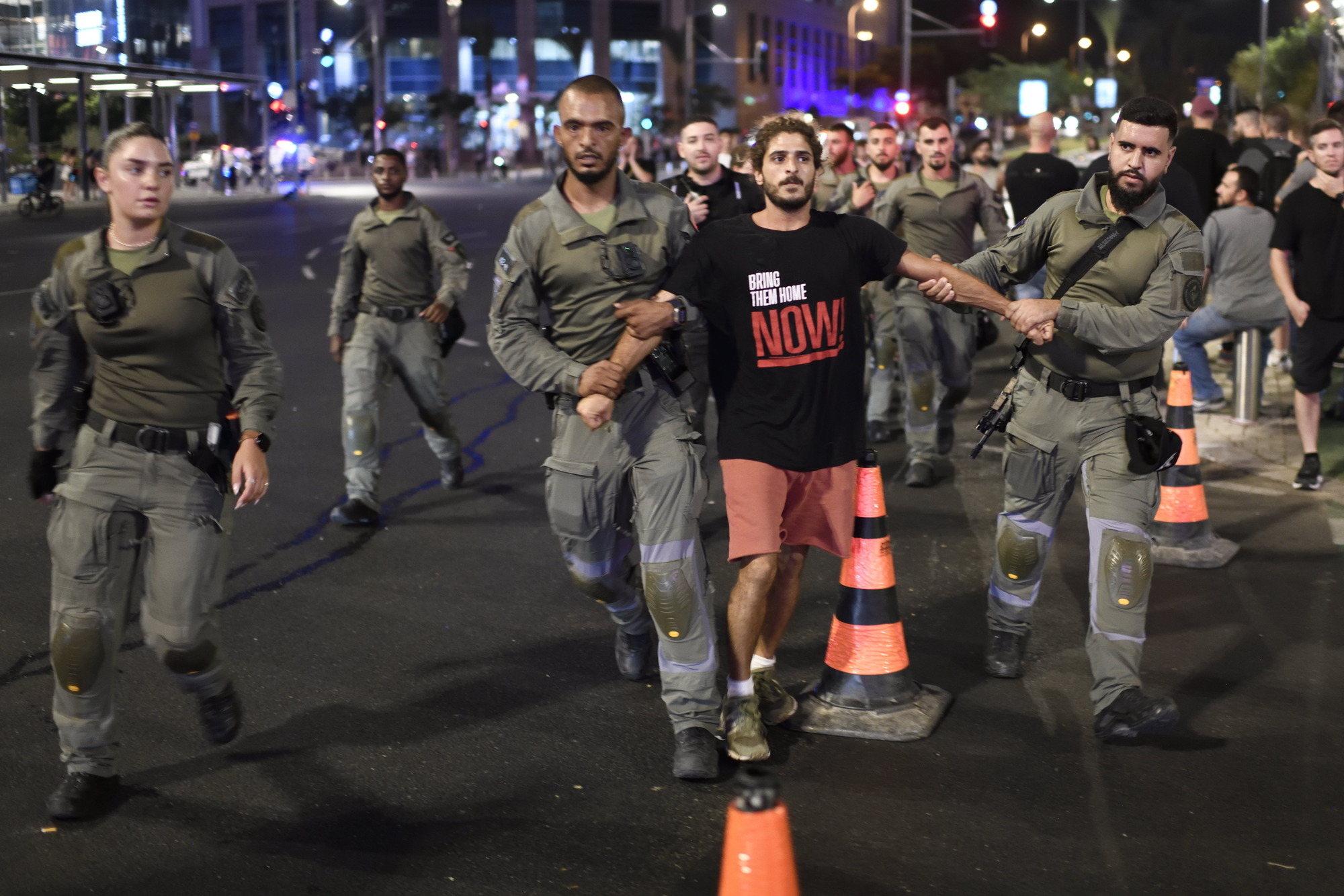Fear of Politicization of Police Prosecution: A Sign to Separate from the Police
To protect the credibility of the police as an impartial law enforcement agency, independent oversight over the police prosecution unit - the police unit that issues criminal charges - must be increased through the Attorney General's office.

Photo by Gili Yaari/Flash90
In recent weeks, there has been a growing number of warning signs regarding the improper politicization of the police and the undermining of equitable enforcement of the law. Protesters against the government, including the families of hostages, have made claims about police violence, political investigations (such as questioning protesters if they are being paid), and false arrests. On the one hand, it could be said that the police are not deviating here from their treatment of demonstrators from other groups. Arabs, Haredim, and Jews of Ethiopian origin, for example, might say: join to the club. On the other hand, the police's leniency in other instances, such as the case of the riot, which included right-wing politicians, that broke into the Sde Teiman detention facility, certainly raises questions. Such leniency is particularly jarring when compared to the extraordinary determination and haste the police displayed, for example, in the arrest of three women who were distributing leaflets at the synagogue of the Likud Member of Knesset Yuli Edelstein, or in the case of Noa Goldenberg, who was recently charged with throwing a handful of sand at the Minister of National Security, Itamar Ben-Gvir. The same can be said about the police in charging Yarden Mann a few months ago of attacking Minister Idit Silman.
It is important to note a crucial point. In both the cases of Goldenberg and Mann, the one who accused these women was not the State Attorney's Office, but rather the Police Prosecution—that is, the police unit that issues criminal charges. The Police Prosecution manages approximately 90% of criminal proceedings in Israel. For decades, there has been criticism of an institution of this nature being located within the police, due to concerns that structural pressures could compromise its independence. Consequently, in 2001, the government decided to merge the Police Prosecution with the State Attorney's Office. However, for years, the government has not tried to implement this decision. On the contrary, the system has promoted reforms aimed at solidifying the current situation, under the assumption that strengthening the independence of the Police Prosecution within the police, alongside tightening its professional subordination to the Attorney General through oversight mechanisms, is sufficient to maintain its independence.
This is a mistaken view. In a study published about a decade ago, I demonstrated significant differences between the functioning of the Police Prosecution and that of the State Attorney's Office, showing that the judgment of the State Attorney's Office is stricter and of higher quality. It is very likely that these differences stem from the influence of police policy on the Prosecution, along with the work methods of the Police Prosecution (the average number of cases handled by a police prosecutor is much higher than those handled by a state prosecutor). The previous State Comptroller published a report in 2019 pointing out that police prosecutors are still not sufficiently independent from the police's investigative bodies and that the oversight and guidance mechanisms by the Attorney General do not operate effectively.
The speed and decisiveness of the Police Prosecution's work in the two aforementioned cases raise serious questions in this context. The role of the Prosecution is to enforce the law based on professional, independent judgment and to make decisions solely according to the law, following a thoughtful and fair examination.
Can we really say that in these cases, the Prosecution managed to oversee the police investigators as required? There is indeed concern that the prosecutors exhibited overeagerness, driven by systemic incentives within the police that demanded determination and decisiveness against these two women.
Unfortunately, Israel is currently in a reality in which the police are losing their credibility as an impartial, a-political law enforcement agency. This makes the challenge of continuing to position the Police Prosecution within the police even more intense, especially at a time in which it is so critical to maintain public trust in its independence. There are two solutions to this challenge. The preferred solution is to merge the Police Prosecution with the State Attorney's Office. However, given the slim chances of achieving this in the near future, and the urgent need to increase prosecutorial oversight of the police and strengthen the independence of the Police Prosecution, immediate action must be taken to implement another solution I outlined in a study published about four years ago, the validity of which is more relevant today than ever: The Attorney General must strengthen supervision over the Police Prosecution by establishing a new oversight unit within the State Attorney’s Office. This unit would ensure the independence and professionalism of the Prosecution through systemic random audits, supervision of recruitment and training, dissemination of guidelines, and more. What is clear is that the current situation is intolerable and could seriously harm public trust in the law enforcement system, not to mention the principle of equitable enforcement of the law.
- Tags:
- Police and Internal Security,
- Rule of Law,
- Right to Equality,
- Security and Democracy,
- Politicizing Security Agencies,
- police,
- Policy Recommendations,
- Separation of Powers,
- Rule of Law,
- The Quiet Overhaul,
- Concentration,
- Democratic Values and Institutions Program,
- Political Reform Program,
- Center for Democratic Values and Institutions,
- Center for Security and Democracy
